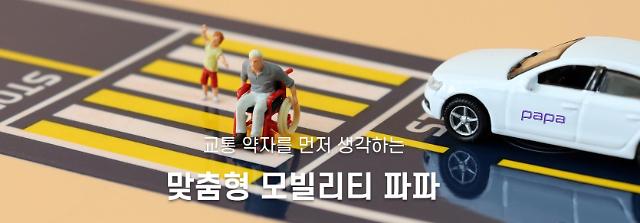
[Courtesy of Papa Mobility]
SEOUL -- Papa Mobility, a ride-hailing service operator in South Korea, is targeting the country's socially disadvantaged people to provide differentiated services including the door-to-door escort service in a bid to survive in South Korea's mobility service sector mainly dominated by traditional taxi companies and individual taxi operators.
South Korea with some 250,000 registered taxis is a no man's land for other mobility service operators because they would have to face angry protests by taxi drivers. According to data released by the transport ministry, the average age of taxi drivers, including corporate workers and individual taxi operators was 62 in 2021. Because driving a taxi is about the only job they can have due to their old age, aged taxi drivers are desperate to keep new rivals off their turf.
Currently, because of strong resistance from taxi drivers, the government allows a company that manages mobility services based on rental cars to only operate 100 cars, but it is not enough for small and medium-sized companies and startups to further expand their businesses or meet growing market demands.
Papa Mobility was launched in 2019 for the first time as a mobility service for the socially disadvantaged. The company went through a hard time during the COVID-19 pandemic but it saw an annual average sales increase of about 20 percent thanks to special vehicles that can carry customers while riding on a wheelchair.
"The market demand for services for the socially disabled and premium services is skyrocketing after the pandemic but we are having trouble with the government's regulation on the maximum number of operable vehicles," Papa Mobility CEO Kim Young-tae told Aju Business Daily on June 20. "I hope the transport ministry comes up with a forward-looking policy considering the social value of our company," Kim said.
The mobility service for the socially disadvantaged offers "escort services" where the driver will accompany his or her customer during the duration of the trip. The service is favored by the disabled, elderly, wounded, or parents with young children. Not only do the drivers operate their vehicles, but they can also help their customers move inside a hospital and offer a professional chauffeur service. About 80 percent of customers use Papa Mobility's service again, Kim said.
"Because of the aging society, the number of transportation-vulnerable people is steadily increasing. Also, foreign customers who seek Papa Mobility services are rapidly increasing," Kim said, adding that the company goes through a series of verification tests on its employees so that they only select people with no criminal records. "We will continue to analyze customer's inconveniences and needs to become the top mobility platform that also fulfills its social duty," Kim said.
South Korea's top web service company Kakao operated a beta test for Kakao T Carpool, a ride-hailing app, in 2018. However, the web service giant was confronted by some 15,000 taxi union members who gathered in central Seoul to hold a rally. Taxi drivers argued the carpool service would damage their business. They also want the government to revise a law that stipulates that the owners of passenger cars can receive money when they provide rides for other people during commuting hours.
The official version of Kakao T Carpool was to be released in December 2019 but the company withdrew its decision two taxi drivers -- a 57-year-old and a 64-year-old -- died by self-immolation in protest against Kakao's ride-hailing service. Before Kakao, American ride-hailing app operator Uber introduced a car-sharing service in Seoul in 2013 but suspended it two years later due to strong protests by taxi drivers. The American company came back with its premium taxi service, Uber Black, in Seoul in 2016.
The latest mobility service that brought outrage from taxi drivers was Tada. The mobility service hired ordinary drivers without a commercial driver's license to operate rental cars for Tada's ride-hailing service. Some 12,000 taxi drivers gathered near central Seoul to hold a rally and urged lawmakers to come up with an anti-Tada law that would prohibit similar services from threatening the livelihood of taxi drivers.
In 2019, heads of Tada and SoCar, a car-sharing service, were indicted by prosecutors on complaints from Taxi drivers who insisted Tada was engaged in illegal taxi service and violated the law that forbids rented vehicles from offering rides in exchange for money. While taxi drivers claimed that it was illegal for Tada to operate a taxi-like service through drivers without a proper license. Tada claimed that its service was legal.
However, a criminal court in Seoul found Tada head Park Jae-uk and SoCar head Lee Jae-woong not guilty and rejected an argument by state prosecutors that it is an illegal paid taxi service. The court defined Tada as a rental car service based on mobile applications. On June 1, 2023, South Korea's top court upheld the lower court's acquittal of Park and Lee on charges of violating the passenger transport service act with their ride-hailing service.
Copyright ⓒ Aju Press All rights reserved.




